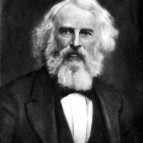
Henry Wadsworth Longfellow (1807–82) was a celebrated American poet of the nineteenth century. Born in Portland, Maine to a well-to-do family, Longfellow began writing poetry at an early age: his first poem, “The Battle of Lovell’s Pond,” was published in the Portland Gazette when he was thirteen. After attending Bowdoin College (where he became good friends with Nathaniel Hawthorne) and studying in Europe, Longfellow taught first at Bowdoin and then later at Harvard College. He oversaw Harvard’s modern language program for eighteen years and was honored in 1884 with a bust in the Poet’s Corner of Westminster Abbey, the first time an American had been accorded that tribute.
Henry Wadsworth Longfellow
This poem by America’s Maine-born and favorite “Fireside Poet,” Henry Wadsworth Longfellow (1805–82), was one of his last, appearing first in the Atlantic in June 1882, several weeks after his death. Like Mary B. C. Slade’s “Soldier’s Memorial Day”, it speaks of decorating the graves of fallen soldiers. But it does so less floridly, and to different effect.
Henry Wadsworth Longfellow
Based on the 1863 poem “Christmas Bells” by Henry Wadsworth Longfellow (1807–82), this carol depicts the solemn mood of the country during the Civil War.The poem was also written just six months after the Battle of Gettysburg where 40,000 soldiers lost their lives.
Henry Wadsworth Longfellow
“Paul Revere’s Ride” (1860), one of the best known poems by the celebrated American poet, Henry Wadsworth Longfellow (1807–82), was published just days before the start of the Civil War, years after the event that it commemorates. In fact, the poem takes a largely forgotten Revolutionary War figure and turns him into a national hero.
Henry Wadsworth Longfellow
In this excerpted poem (1850), Henry Wadsworth Longfellow (1807–82), popular American poet and educator, uses the extended metaphor of the “ship of state” to describe our still-young republic.
Henry Wadsworth Longfellow
Henry Wadsworth Longfellow (1807–82) was a celebrated American poet of the 19th century. Born in Portland, Maine to a well-to-do family, Longfellow began writing poetry at an early age: His first poem, “The Battle of Lovell’s Pond,” was published in the Portland Gazette when he was 13. “The Village Blacksmith,” first published in the literary magazine The Knickerbocker in 1840, pays tribute to an ancestor, Stephen Longfellow, who earns “a night’s repose” by his labor.

